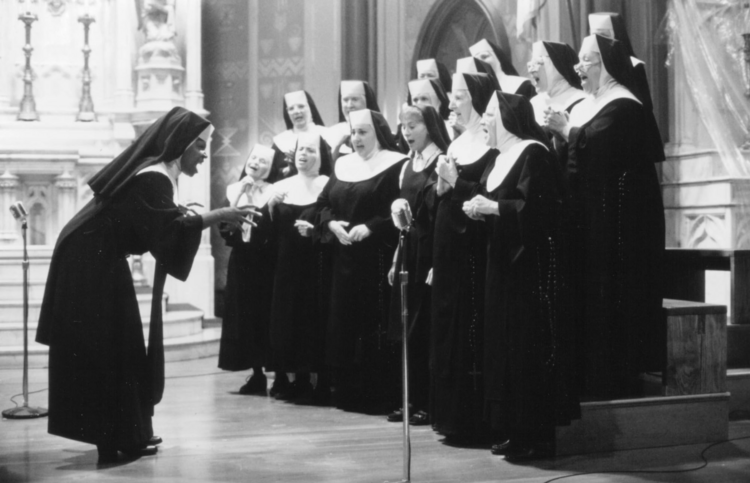On the morning of June 14, Whoopi Goldberg was among a group of comedians who met with Pope Francis. This was Goldberg’s second time meeting the pope, following an audience last fall. Goldberg described that meeting as “remarkable” and mentioned that the pope is “a bit of a fan” of her 1992 comedy “Sister Act,” directed by Emile Ardolino and written by Paul Rudnick. Maybe that’s because Deloris Van Cartier, Goldberg’s character in the film, does exactly what the Holy Father wants all Catholics to do: She helps to create a more inclusive, open church.

Sister Act (1992). Photo by Touchstone Pictures via IMDb.
In the film, Deloris starts as a singer at a Nevada casino, dissatisfied with her career and her affair with her married mobster boss, Vince (Harvey Keitel). Vince is “Catholic” enough that he won’t get a divorce, but those scruples don’t extend to his affair nor to his shady business dealings. Deloris witnesses Vince’s goons murder an informant and she runs to the police for protection. They devise a supposedly foolproof plan to keep her hidden until the trial: Disguise her as a nun at the convent of St. Katherine Parish in San Francisco.
“Sister Act” came out about midway between Vatican II and the first sessions of the Synod on Synodality, and it embodies the welcoming spirit of both, and the vision of a church willing to go out into the street. When Deloris’ new-and-improved choir first sing at Mass (an upbeat version of “Hail Holy Queen” that involves gospel claps and theatrical vocals), people from the block begin to wander into the church, muttering the words that many pastors pray to hear: “What’s going on in there?” Soon the pews are packed. Is that to say that the secret to evangelization is a jazzy Mass?
Not at all: Deloris succeeds because she understands life beyond the convent walls, the troubles and complications of everyday people. Inspired by her, the nuns begin to go out into the community, building a playground and forming relationships with the lost souls drifting along their graffiti-covered street.
None of this changes the church’s core message, or waters it down to make it more palatable. In fact, it amplifies it. St. Katherine’s is still a church. And by the end of the film it’s a church that has, as Pope Francis said, “the smell of the sheep.”
As Catholics around the world discern what evangelization should look like in this day and age, perhaps we should take a lesson from this early ’90s Disney comedy. Mother Superior learns that you can’t live out the Gospels by walling yourself off from the world. If the world seems hopeless and inhospitable to the Good News, maybe that means we need to find new ways to preach it. Like the nuns of St. Katherine’s, we need to find ways to communicate the joy and beauty of our faith, through acts of charity, words of hope, and, yes, spirited music.
News
LeBron James faces backlash for ‘snapping’ at young fan after Olympics win, what’s going on
LeBron James has received backlash after he pointed in the face of a young kid who was asking for a picture following Team USA’s basketball Olympic gold medal LeBron James has been slammed for his interaction with a young fan (Image:…
Dave Portnoy banking on Caitlin Clark to win him $10m from ambitious wager
Barstool Sports CEO Dave Portnoy once again places a massive wager, picking Caitlin Clark and the Indiana Fever to win the WNBA title this October. Dave Portnoy has consistenly backed Caitlin Clark during her rookie year (Image: Getty Images) Barstool’s Dave Portnoy has launched…
Taylor Swift Blocks Kanye West From No. 1 Debut as ‘Tortured Poets’ Tops ‘Vultures 2’
Taylor Swift’s ‘TTPD’ scores a 14th week at No. 1 on the Billboard 200 chart with Kanye West’s ‘Vultures 2’ coming in at No. 2 Taylor Swift’s The Tortured Poets Department has earned its 14th week at No. 1 on the Billboard…
Shocking News: Just as Taylor Swift and Travis Kelce Romance Heats Up, Donna Kelce Revealed that Travis and Ex-Girlfriend Kayla Nicole are Expecting
In a surprising turn of events, the blossoming romance between pop superstar Taylor Swift and NFL player Travis Kelce has taken a dramatic twist. Just as the couple’s relationship appears to be heating up, it has been confirmed that Kelce…
Steph Curry ‘night night’ celebration explained as USA hero delivers iconic Olympics image
Stephen Curry produced an iconic moment in the final seconds of Team USA’s gold medal victory over France, draining a deep 3-pointer before celebrating with his signature ‘night night’ move Steph Curry performed his good night celebration as Team USA…
PHOTOS: Brittney Griner’s Wife Absolutely Stunned In Her Private “Dump” At The Paris Olympics
Cherelle Griner had the time of her life at the Paris Olympics as she cheered on her wife. Cherelle Griner (Photo by Elsa/Getty Images) Two years after serving time in Russian custody, Brittney Griner won her third Olympic medal as she helped…
End of content
No more pages to load











